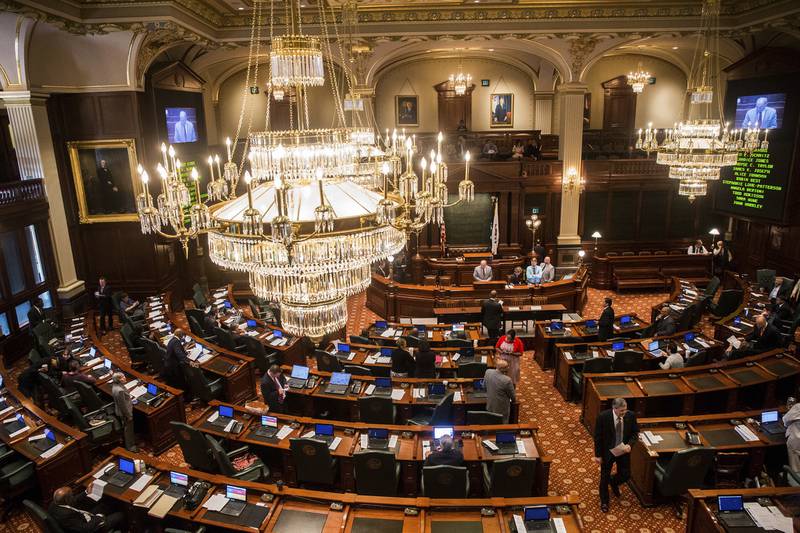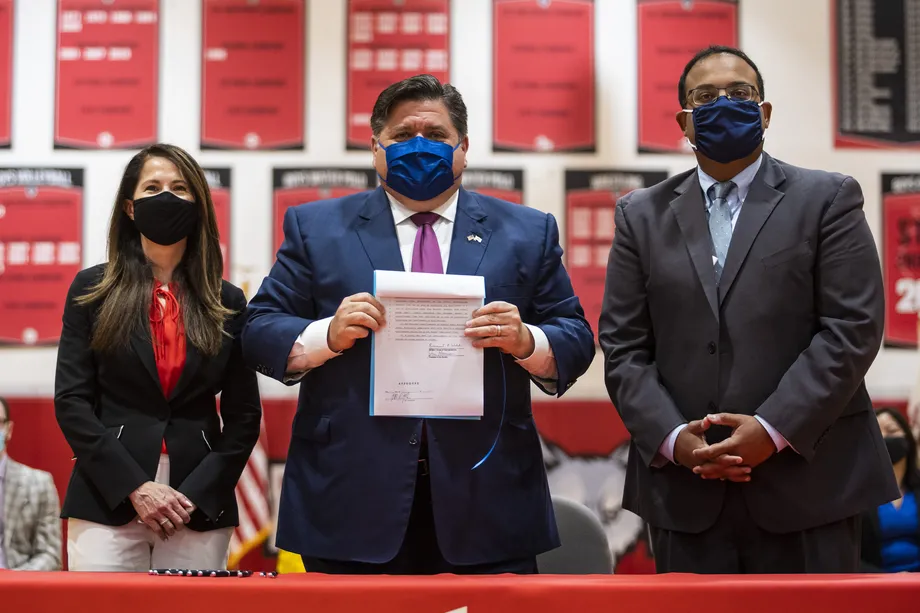

48岁的江珍妮说,她的祖父母1920年代从广东台山移居到美国,经历“排华法案”差点被递解出境的艰困,开启她对移民权益的关注,在从事多年移民律师工作后,她决定投入参选。
江珍妮说,由于祖父母的千辛万苦的移民经历,让她从很年轻时,就立定志愿要成为帮助移民儿童的律师。她先后担任了伊州无成人陪伴儿童工作小组的共同主席,也是海岚公园高林法律扶助所(Highland Park-Highwood Legal Aid Clinic)的首位主任。
拥有印第安纳大学新闻学士、罗耀拉大学法学博士的江珍妮,也是西北大学国际人权法律的硕士,如果当选,江珍妮说,她将推动“累进式所得税”,取代现行的齐头式征收,确保百万与千万富翁支付“合理”税赋。
育有三个儿子的江珍妮,对于教育议题也相当重视,她说,出来竞选州众议员的主要目的之一,就是要改善现在公立学校系统的经费分配,她表示,现在伊利诺州公校资金,绝大部分仰赖民众缴交房地产税,江珍妮认为,应该加重州府负担教育经费的比例。Edit

(Script from 2022 AAPI month webinar )Rep. Jennifer Gong-Gershowitz
APAPA Speech – May 14, 2022
Thank you for inviting me here to speak tonight. I am so grateful for the work
that Asian Pacific Islander American Public Affairs Assoc (APAPA) does around the
country, particularly around including Asian American voices and stories in school
curriculum.
My family’s story–or what I knew of it until law school–was the fairytale version
of the quintessential “American immigrant story” – one that paints a picture of
success, achievement and belonging. It was all true, but it isn’t the whole story.
I am a third generation Chinese American. My grandparents came to this country
in the 1920s, started a business and a family, raising their 5 children in what was
then the small town of Portland, Oregon. All 5 graduated from college, among
them – a doctor, a scientist, a college professor, a music teacher and an artist.
Two of my uncles served in WWII and my father served our nation in Viet Nam.
What’s missing is the critical context for my family’s experience, which is
reflective of the shared experience that shapes what I now understand is Asian
American history.
I first learned of the Chinese Exclusion Acts and studied the constitutionality of
incarcerating Japanese Americans in the 1940s when I was in law school.
Throughout elementary school, high school, and college, none of my history or
social studies classes covered these or other Asian American stories.
I knew nothing of my own family’s history or the shared experiences of other
Asian American families that are fundamental to American history until law
school. And so, my cousin, my father, and I began to research our own family
history.
We learned that my grandparents faced discrimination and deportation under
racist policies codified in the Chinese Exclusion Acts. For years, they lived in fear
of being deported at any moment simply because they were Chinese. They were
considered illegal human beings by our government at the time.
My father was just a baby during all of this and my grandparents kept certain
information from him as he grew up. I thought I had hit a dead end and details
about my family’s history would forever be a question mark until I learned that
my grandparents had been represented by a civil rights lawyer who fought my
Rep. Jennifer Gong-Gershowitz
APAPA Speech – May 14, 2022
grandparents’ deportation for over a decade and that his sister-in-law was still
living in Portland.
My Dad and I went to Portland as soon as we could and she filled in so much of
what had been lost to time as we retraced our shared histories.
Like many immigrants, my grandparents had no idea how to best represent
themselves in an American court of law. They had no legal background,
particularly in American law. They weren’t native English speakers. To be frank,
the cards were stacked firmly against them.
But thankfully there was a civil rights attorney that helped my family. He guided
them through the legal process, navigated the often-byzantine immigration
system, and ultimately helped my grandparents secure United States citizenship
once and for all. Had my grandparents been denied access to representation –
whether through a lack of right or lack of access – I would not be standing in front
of you today.
It is because my grandparents had access to representation that they were able to
secure justice. It is that simple fact that inspired me to focus on immigration law,
to become the first American to earn a degree in International Human Rights Law
at Northwestern University, and to launch a legal aid practice to help immigrant
families just like that civil rights attorney helped mine.
It also inspired me to run for office. As a legislator, my job is to shape policy that
reflects my community’s values and to fulfill my duty each and every day to act in
the public interest and for the common good. As 1 of only 4 Asian Americans out
of 118 members of the Illinois House, I also have the distinct honor and
responsibility to ensure that the Asian American community has a voice in the
legislature.
I didn’t learn my family’s story until I was in law school. Critical pieces of
American history were missing from my education. I wasn’t told about the
Chinese Exclusion Acts in history class. Because of that, a piece of who I am – my
identity – was missing.
That’s why I sponsored a piece of legislation known as the TEAACH Act, which
made Illinois the first state in America to require k12 history classes include a unit
on Asian American history.
Rep. Jennifer Gong-Gershowitz
APAPA Speech – May 14, 2022
The TEAACH Act is about uplifting Asian American stories at a time of rising antiAsian hate and violence, ensuring that Asian American history is taught in school.
The lack of representation in curriculum, positions of power and in media leads to
miseducation. The TEAACH Act allows all students to learn that Asian Americans
have been a part of the fabric of American history, providing a framework for all
students to better understand Asian American communities, experiences, and
histories.
This legislation is very personal to me. Learning the truth about my family’s
history and the larger history of the Asian American community was a pivotal
moment that inspired me to dedicate my life to fighting for people whose basic
human rights are at risk. This legislation ensures the next generation of Asian
American leaders won’t have to travel across the country or attend law school to
learn about their own history and heritage.
The TEAACH Act provides examples to young Asian American students who often
see a lack of role models in commonly-taught American history. I believe that you
cannot be what you cannot see, and we must let Asian American students see
what people that look like them have accomplished and how crucial we have
been to this great nation. Ensuring that Asian American history is taught in our
schools lays a foundation for all students in Illinois and advances racial equality.
I also believe that empathy comes from understanding. We cannot do better
unless we know better. But – when people don’t learn about Asian Americans,
the effect is non-Asian people start to believe in stereotypes and behave towards
Asian Americans based on those stereotypes. A lack of knowledge is the root
cause of discrimination and the best weapon against ignorance is education.
The TEAACH Act takes effect during the 2022-2023 school year in Illinois. After
TEAACH Act was passed last year, the State Board of Education started
implementation efforts almost immediately. First, a working group made up of
educators across the state of Illinois, particularly those with expertise in Asian
American history, and a broad group of community leaders representing the
diverse Asian American community was assembled. Of the 25 members of the
working group, 19 identify as AAPI. That working group developed a variety of
free resources for teachers across grade levels and subject areas – not just in
Rep. Jennifer Gong-Gershowitz
APAPA Speech – May 14, 2022
social studies or history, but incorporating relevant themes and concepts via art,
music, and other subjects.
Local grassroots efforts by Asian American organizations and individuals have
proven invaluable to the process. The locally-focused orgs also working with local
schools to develop and implement appropriate curriculum.
Much of the guidance surrounding implementation of the TEAACH Act will occur
through regional State Board of Education offices, which work with local school
boards to facilitate. These regional offices will work closely with local school
districts to implement policies that fit best.
When we went to launch TEAACH, we understood that the disparity in funding
from one school to the next would doom a one-size-fits-all approach. According
to a recent report by GreatSchools.com Illinois has over 800 school districts that
include over 10,000 schools – there are tremendous differences in the advantages
and challenges each of these schools face.
Resources must be made available at no cost to teachers. For example, the PBS
documentary offers companion common core curriculum resources aligned with
national standards. The Illinois State Board of Education has developed a variety
of free resources to be used in classrooms, as well. It is an excellent start, but
creating more high-quality, grade-specific content available for free to all students
and teachers is crucial expanding these efforts.
We are also exploring a certification course with the University of Illinois for
teachers that would be made available to provide formal certification/continuing
education in teaching Asian American history.
I applaud Asian Pacific Islander American Public Affairs for the work you are doing
around the country to implement legislation similar to the TEAACH Act. I was
overjoyed when I learned that New Jersey has established a similar law.
From what I understand, you are currently working at the grassroots level in
California to get SB 1363 approved, which would encourage Asian American
history to be taught in grades 1 through 12. Getting this legislation approved
would be a major victory for millions of students in California.
Rep. Jennifer Gong-Gershowitz
APAPA Speech – May 14, 2022
As an advocate for public policy, your most powerful tool is your voice. Be heard!
Call your state legislators, your governor, and anyone else who might play a role
in ensuring greater access to Asian American history.
In my experience as a legislator, I have found that if one constituent calls me
about an issue, I notice. If five constituents call me about an issue, we have a
staff meeting to discuss the issue. If ten people call me about an issue, I can be
confident that most of the district is concerned about the same issue.
If there isn’t already an effort to pass similar legislation in your state, you can be
the catalyst that starts the change. APAPA has resources to help you bring the
message to your legislator and encourage them to take up this crucially-important
piece of legislation.






